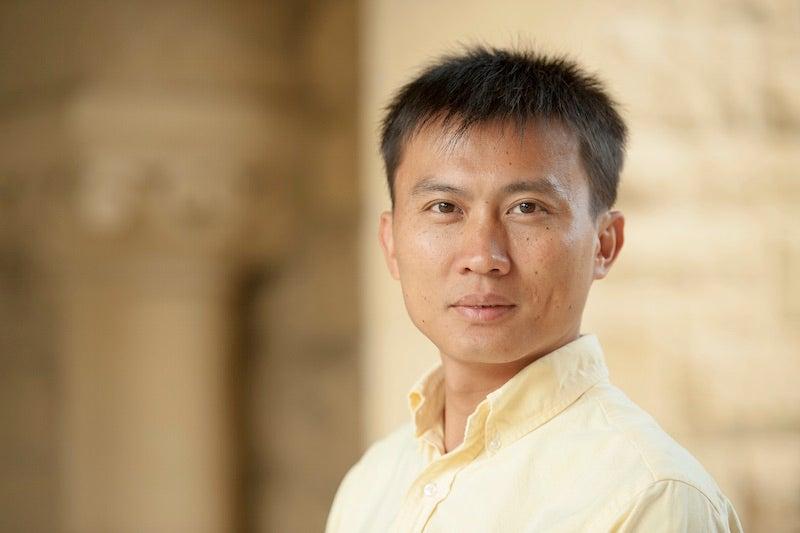Yi Cui Named Blavatnik National Laureate
The award recognizes the Stanford/SLAC professor’s pioneering work in the fields of energy and nanomaterials science.
By Angela Anderson
Pioneering nanoscientist Yi Cui, professor of materials science and engineering at Stanford University and of photon science at the Department of Energy’s SLAC National Accelerator Laboratory, has been named a 2017 Blavatnik National Laureate. The $250,000 award recognizes the most promising researchers age 42 and younger at top U.S. academic and research institutions.
“Professor Cui is a world-leading researcher in the fields of energy and nanomaterials science who is making extraordinary contributions to these important areas of technology. His approach towards achieving the goals of efficient storage and conversion of energy by exploiting precise nanoscale materials design is extremely creative, and is already having a global impact,” said David Awschalom, University of Chicago molecular engineering professor and a member of the 2017 national award jury.
Cui was among 30 finalists competing for the Blavatnik National Award for Young Scientists over the past four years, and one of three selected to receive the 2017 prize.
“I am honored to win the National Laureate this year and glad to join the past laureates who are the top among the tops,” he said.
Cui is the recipient of numerous other awards recognizing his prolific work in energy, environmental and technological solutions, including research in nanoscale electronic and photonic devices, batteries, solar cells, microbial fuel cells, water filters and chemical and biological sensors. Three of his innovations were named Scientific American top 10 "World Changing Ideas” in 2010, 2014 and 2016. He has published more than 360 scientific papers.
Cui received his bachelor’s degree from the University of Science and Technology of China in 1998 and his PhD from Harvard University in 2002. He joined Stanford faculty in 2005 and SLAC in 2011 and is an investigator with the Stanford Institute for Materials and Energy Sciences (SIMES), a joint institute of Stanford and SLAC.
Cui is an associate editor of Nano Letters and co-director of the Bay Area Photovoltaic Consortium and the Battery500 Consortium, which are both funded by the DOE. He founded the company Amprius, Inc., in 2008 to develop and manufacture high-energy and high-capacity lithium-ion batteries.
Cui hopes the award will help his lab gain recognition in the public and scientific communities. “The generous support provided by Blavatnik will help me to focus on doing the best science,” he said.
“My goal is to generate leading-edge technologies for sustainable energy and environmental protection. I want to generate breakthrough technologies that can change the world, commercialize these technologies to make a real impact on society, and mentor many outstanding students who will develop high-impact technologies throughout their careers.”
Also named 2017 Blavatnik National Laureates are Feng Zhang of the Broad Institute of MIT and Harvard for life sciences and Melanie S. Sanford of the University of Michigan for chemistry.
2017 finalists also included Stanford’s Jure Leskovec, a computer science professor who uses internet data to test sociological models and theories, shedding light on the mechanisms of influence and trust in social and information networks; and Sergei Kalinin of the DOE’s Oak Ridge National Laboratory, a materials scientist who creates novel technologies to study and control the functionality of nanomaterials by combining imaging, big data and materials theory.
The annual Blavatnik Awards for Young Scientists, established in 2007 by the Blavatnik Family Foundation and administered by the New York Academy of Sciences, honors outstanding early-career scientists in the life sciences, chemistry, physical sciences and engineering.
Contact
For questions or comments, contact the SLAC Office of Communications at communications@slac.stanford.edu.
SLAC is a multi-program laboratory exploring frontier questions in photon science, astrophysics, particle physics and accelerator research. Located in Menlo Park, Calif., SLAC is operated by Stanford University for the U.S. Department of Energy's Office of Science.
The Stanford Institute for Materials and Energy Sciences (SIMES) is a joint institute of SLAC National Accelerator Laboratory and Stanford University. SIMES studies the nature, properties and synthesis of complex and novel materials in the effort to create clean, renewable energy technologies. For more information, please visit simes.slac.stanford.edu.
SLAC National Accelerator Laboratory is supported by the Office of Science of the U.S. Department of Energy. The Office of Science is the single largest supporter of basic research in the physical sciences in the United States, and is working to address some of the most pressing challenges of our time. For more information, please visit science.energy.gov.






